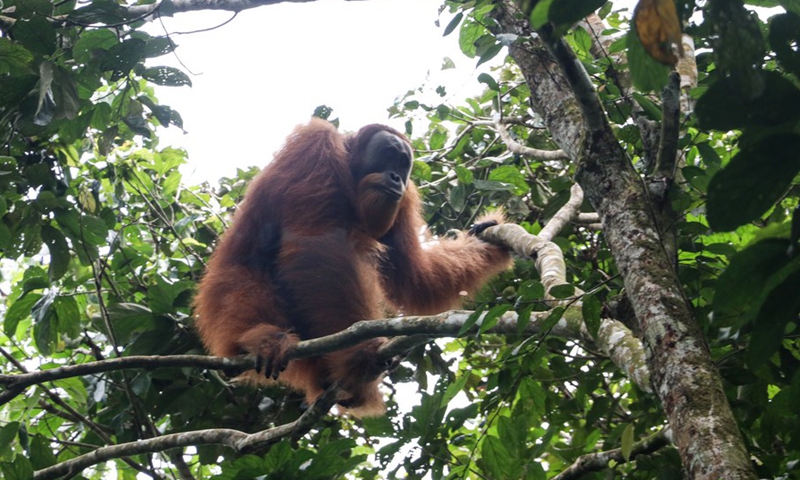UN deforestation plan scrutinized after Indonesia debacle
Failed deal reveals REDD+ issues

A wild male Sumatran Orangutan is seen on the top of the tree before it is caught for rescued at Summer Bakti village in Nagan Raya district, Aceh, Indonesia. Sept. 25, 2021.(Photo: Xinhua)
The collapse of a $1 billion deal to curb Indonesian deforestation has highlighted the pitfalls of a UN-backed global initiative, which critics say has been ineffective and trampled on indigenous communities' rights.
Protecting trees is key to meeting climate goals, with tropical rainforest loss accounting for about 8 percent of annual carbon dioxide emissions, according to monitoring platform Global Forest Watch.
"This is make or break for the global climate," said Frances Seymour, a forestry expert from the US environmental think tank World Resources Institute.
A key tool has been the United Nations-backed REDD+ mechanism, a framework where public and private funds are paid to developing countries to curb emissions.
Hundreds of projects have sprung up worldwide under the initiative over the past decade and major donors include Norway, Germany and Britain.
Projects range from national-level schemes supported by foreign governments to private ones, which generate "carbon credits" to be sold to firms seeking to offset emissions.
But the initiative has been dogged by controversy, with environmentalists saying projects in some places such as Cambodia, Peru and the Democratic Republic of the Congo have failed to involve local communities and bring benefits, in some cases leading to conflict.
In September, Indonesia, home to the world's third-largest expanse of tropical forest, walked away from the $1 billion deal with Norway, having received only a tiny fraction of the money. Joe Eisen, executive director of Rainforest Foundation UK, said REDD+ is fundamentally flawed: "The architecture is wrong. It reduces forests down to their carbon values, rather than the other values they have, like the people and nature."
For the initiative's detractors, the collapse of Indonesia's deal with Norway, which was agreed in 2010 in a bid to reduce the Asian nation's rampant deforestation, has underlined REDD+ weaknesses.
Indonesian officials told the Jakarta Post they terminated the deal because Norway had shown "no goodwill" and set additional requirements such as documentation on how the cash would be spent.
But Norway's ministry of climate and environment told AFP they believed the "few issues that remained could have been resolved quickly."
AFP



